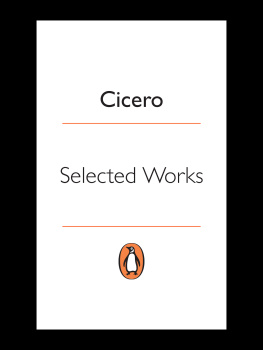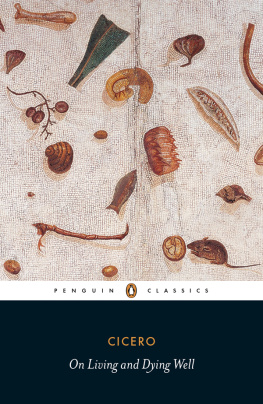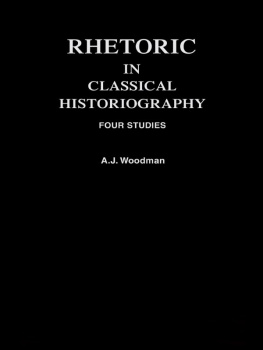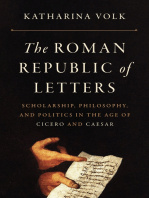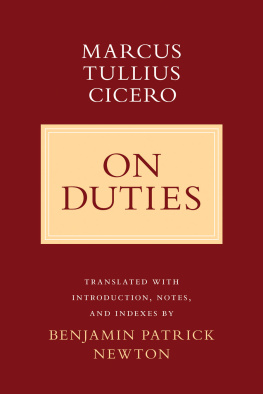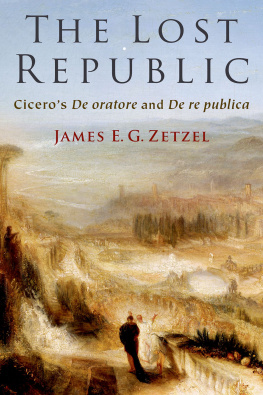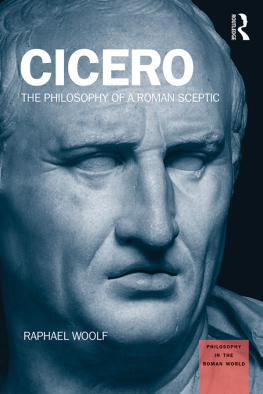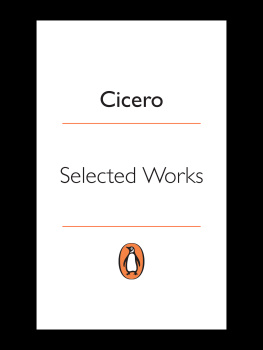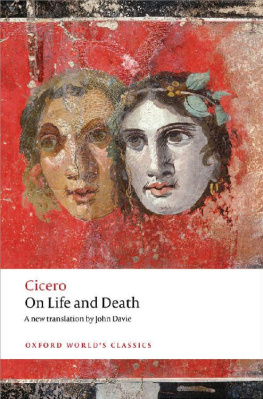A Written Republic
A Written Republic
CICEROS PHILOSOPHICAL POLITICS
Yelena Baraz

Copyright 2012 by Princeton University Press
Published by Princeton University Press, 41 William Street, Princeton, New Jersey 08540 In the United Kingdom: Princeton University Press, 6 Oxford Street, Woodstock, Oxfordshire OX20 1TW
press.princeton.edu
All Rights Reserved
Library of Congress Cataloging-in-Publication Data
Baraz, Yelena, 1975
A written republic : Ciceros philosophical politics / Yelena Baraz.
p. cm.
Includes bibliographical references (p. ) and index.
ISBN-13: 978-0-691-15332-2 (alk. paper)
ISBN-10: 0-691-15332-9 (alk. paper)
1. Cicero, Marcus TulliusPolitical and social views. 2. Philosophy, Ancient.
3. RomePolitics and government26530 B.C. I. Title.
DG260.C5B29 2012
320.1dc22 2011029791
British Library Cataloging-in-Publication Data is available
This book has been composed in Sabon
Printed on acid-free paper.
Printed in the United States of America
10 9 8 7 6 5 4 3 2 1
To Agnes and Suzanne
sapientiae studiosissimis amicitiae gratia
Contents
CHAPTER ONE
Otiose Otium: The Status of Intellectual Activity in Late Republican Prefaces
CHAPTER TWO
On a More Personal Note: Philosophy in the Letters
CHAPTER THREE
The Gift of Philosophy: The Treatises as Translations
CHAPTER FOUR
With the Same Voice: Oratory as a Transitional Space
CHAPTER FIVE
Reading a Ciceronian Preface: Strategies of Reader Management
CHAPTER SIX
Philosophy after Caesar: The New Direction
Acknowledgments
THIS BOOK WAS a long time coming, and I have incurred many debts along the way. The kernel of what would become my dissertation, from which the book developed, was a paper on amicitia and publication for Trevor Murphys seminar on Ciceros rhetorical works at UC Berkeley. The dissertation itself was written under the supervision of Kathleen McCarthy and Erich Gruen, who dispensed advice, inspiration, and warmth in equal measure. William Fitzgerald was an exemplary reader who always pushed me to dig deeper. I am grateful for the support I received from Mark Griffith and Tony Long. Andrew Dyck read the completed dissertation and offered detailed comments and much encouragement. I also owe a great debt to those Berkeley friends who made sure that I emerged at the other end of the dissertation with my wits still largely intact: Elina Alexandrov, James Ker, Melissa Mueller, Jonathan Ready, Sonia Sabnis, Dylan Sailor, and Enrica Sciarrino.
Various versions of what eventually became this book were presented at several APA meetings, as well as to audiences at Amherst College, Brooklyn College, Harvard University, the Humboldt University in Berlin, Johns Hopkins University, the University of Colorado at Boulder, the University of Pennsylvania, and Yale University. I am grateful to all the audiences for their questions and comments. The third chapter, on translation, benefited from the feedback of Siobhan McElduff and Enrica Sciarrino, who organized a panel on translation at the 2008 APA meeting in Chicago, and from conversations with Pavlos Avlamis, Lawrence Venuti, and Emily Pillinger at the Author-Translator in the European Literary Tradition conference in Swansea in the summer of 2010.
The book took shape over many years and in a variety of places, but it is my current home, the Department of Classics at Princeton University, a place more collegial and intellectually stimulating than anyone outside it is likely to believe, that has made it possible for me to finally bring this project to completion. I made the final revisions during a leave generously supported by Princeton University and a grant from the Loeb Classical Library Foundation, while I was a visitor at the Institute for Advanced Study, a most ideal place to work and think. David Kaufman, my research assistant, lent his philosophical acumen and patiently instructed me in the rules that govern the use of the English article, something I fear I will never fully grasp. Several people read and commented on portions of the manuscript as it was nearing completion and were more than generous with their time, providing mentoring and advice. I want to thank John Dugan, Andrew Feldherr, Harriet Flower, Robert Kaster, Joshua Katz, and Stephen Menn. I am also immensely grateful to the two readers for the Press, Cynthia Damon and Barbara Saylor Rodgers, who were thorough and engaged, helpful and constructive. My editor, Rob Tempio, guided me through the process with efficiency and good cheer. I am grateful to my copyeditor, Eva Jaunzems, for her careful and thoughtful work and to my production editor, Karen Fortgang, for her help during the final stages.
Kathleen Coleman presided over the committee that awarded me the APA/NEH Thesaurus Linguae Latinae fellowship, carefully guided me through the process of training, and welcomed me into her home. I am grateful for her continuing support. Erich Gruen generously signed on to a literature dissertation at a time when he was inundated with other commitments. His kindness and support over the years mean more to me than words can ever express.
I have been lucky in friendship and would like here to offer my gratitude and affection to the following friends: Elizabeth Baughan, Janet Downie, Alan Fishbone, David Goldstein, Constanze Gthenke, Brooke Holmes, Nigel Holmes, Barbara Karger, Joshua Katz, Athena Kirk, Peter Krentz, Peter Mazur, Gillian McIntosh, Michael Preston, Marina Rubina, Kirsten Tranter, Anna Uhlig, Leah Wittington, and last, but never least, Froma Zeitlin.
My parents, Lyubov and Eduard Baraz, and grandparents, Bella and Mikhail Baraz, left their lives in Russia in 1993 mainly to give me a chance at a different kind of future. Since then their own lives have been far from easy, but their support and love for me has been unconditional and unstinting. I can never thank them enough. My husband, Andrs Ferencz, in whose field the 1980s count as antiquity, has for over ten years put up with all sorts of classical nonsense and exhibited miraculous patience at locales ranging from conferences to overgrown ancient sites. He also gave me the seven volumes of Shackleton Baileys Letters to Atticus as a graduation gift. I cannot imagine a better partner. Our daughters, Julia and Katherine, are a daily source of joy to both of us.
Having written about dedications, I am very aware that I am breaking a convention in dedicating this book to friends. But I feel that Cicero would have understood. For more than ten years, my two closest friends, my house philosophers, Agnes Gellen Callard and Suzanne Obdrzalek, not only offered unconditional support, but shared their love for philosophy and their philosophical lives with me. It is to them that I dedicate this book.
Y. B.
Princeton
March 2011
Abbreviations and Translations
ANRW | Aufstieg und Niedergang der rmischen Welt. Geschichte und Kultur Roms im Spiegel der neueren Forschung. Berlin 1972 |
RE | Real-Encyclopdie der classischen Altertumswissenschaft. Ed. A. von Paully, G. Wissowa, and W. Kroll. Stuttgart 18931980. |
TLL | Thesaurus Linguae Latinae. Leipzig 1900 |
References to Latin texts follow the conventions of the Oxford Latin Dictionary, with the exception of Ciceros Letters. There, in addition to the vulgate numbering, the numbers in D. R. Shackleton Baileys editions are included, as in the following example:
Next page

